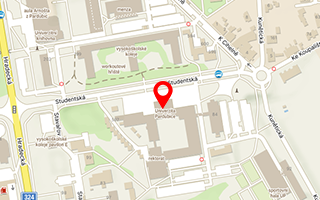The study programme involves a set of courses taught in English, combined to provide students with mechanical and electrical engineering skills relevant to rail vehicles. The list of study courses arranged in semesters is given below. Each title is followed by the number of hours (lectures + tutorials) per week and the number of ECTS credits allocated to the course.
Selected topics in mechanics (2+2 h/week, 6 ECTS)
One of the important fields of mechanics is the theory of mechanical vibration. In this course, you will gain a broad understanding of the vibration of discrete and continuous systems. You will learn essential concepts (linear/nonlinear systems, modes of vibration, damping, etc.) and the methods of solving mechanical vibration problems. This is aimed at applications in engineering; in particular, vibration of rail vehicles in motion will be of interest.
Technical documentation and CAD systems (0+3 h/week, 5 ECTS)
This course focusses on the principles of technical documentation as used in rail engineering. You will improve your knowledge of rules and standards in technical documentation. You will learn how to create components and assemblies in a 3D CAD environment and convert them into 2D drawing documentation.
Limit states of materials in railway applications (2+2 h/week, 6 ECTS)
You will learn about the range of materials, particularly metals used in the construction of rail vehicles and infrastructure, with a focus on the physical principles of the response of the material to loading. Separate chapters are devoted to the issues of initial quality of materials and the methods of its testing. Additionally, the evaluation of mechanical and thermal durability according to specific operational requirements is of interest. The theory is supported by practical laboratory exercises and presentation of real applications.
Rail transport (2+1 h/week, 4 ECTS)
This course serves as an introduction into the rail-specific part of the study programme, explaining the basics of function, design, and operation of rail vehicles and infrastructure.
Train dynamics (2+2 h/week, 5 ECTS)
The first theoretical course specific to rail vehicles is focused on the basic principles of modelling of train motion, including the analysis of factors influencing the train dynamics. You will learn to solve the basic tasks of traction mechanics – calculations of running time, train weight and energy consumption.
Electrical traction (2+2 h/week, 5 ECTS)
The advantages of rail transport are the strongest when electric energy is used to move the vehicles; even most diesel powered vehicles make use of electric power transmission. The aim of the course is to familiarise students with the basic principles and elements of traction circuits of rail vehicles and traction power supply systems.
Selected topics in strength of materials (2+2 h/week, 5 ECTS)
This course deals with advanced cases of machine parts stress and failures. You will learn to calculate mechanical stress and deformation in elastic and elastic-plastic fields, assess the safety of machine parts, and design them to attain required load-carrying capacity and service life.
Rail vehicles I (2+2 h/week, 5 ECTS)
With the basic knowledge from the course Rail transport, you will learn more about the design of non-powered railway vehicles – freight wagons and coaches. Each topic in this course deals with a particular assembly with regard to design requirements, currently used solutions, their function, and role in the vehicle system. You will understand the function of components and the principles and reasons behind the design solutions.
Braking systems of rail vehicles (2+2 h/week, 5 ECTS)
The issues of rail vehicle brakes are covered in a separate course. In this course, the requirements, function and design of braking systems is explained – including the mechanic and pneumatic parts, controlling of braking performance, wheel slide protection devices, etc. Additional topics such as electropneumatic brake, magnetic track brake, and brake testing are included as well.
Operation, maintenance and repairs of rail vehicles (2+2 h/week, 5 ECTS)
This course covers both technical and legal topics relevant to the operation and maintenance of rail vehicles. You will learn about the standards for vehicle design, acceptance, and operation; about the technology and procedures used in railway depots. You will understand the concepts of reliability engineering, life cycle costs, and degradation processes.
Theory of rail vehicles (3+1 h/week, 6 ECTS)
The safety, economy and running comfort of today’s trains are the result of careful design, based on a thorough understanding of the theory of vehicle movement. This course explains how principles of geometry and mechanics are applied to the behaviour of rail vehicles. You will learn about wheel–rail contact geometry, guiding of wheelsets in tangent track and in curves, creep forces and adhesion, derailment safety, and other problems.
Electric circuits and machines (2+2 h/week, 4 ECTS)
This course aims to provide the knowledge necessary for analysis and design of electric circuits, with a focus on those used in power conversion systems and in driving systems of powered rail vehicles. The topics include mathematical description of elements and circuits, magnetic properties of ferromagnetic materials, and particularly electric machines and devices: transformers, DC and AC motors, switching and protection devices.
Finite element method (2+2 h/week, 5 ECTS)
With the knowledge from previous courses in mechanics and strength of materials, you will continue developing skills in solving mechanical engineering problems using numerical tools. The finite element method (FEM) is a powerful instrument for various applications. In this course, you will learn how to use it in advanced cases including geometrical and material non-linearities, stability, heat transfer, and contact problems.
Rail vehicles II (2+2 h/week, 6 ECTS)
The course follows up on Rail Vehicles I and explains further particulars of design of powered railway vehicles, especially their running gear and mechanical components of the wheelset drive system.
Computational methods in design and analysis of rail vehicles (2+2 h/week, 5 ECTS)
In this course, you will learn about modern methods of analysis of dynamical properties of rail vehicles, as used in research, development, and design of rail vehicles. This is ultimately directed to numeric simulations of vehicle running behaviour. Computational tools for this purpose are commercially available, but care must be taken to use them properly and interpret the results correctly. You will develop these skills in this course.
Testing of rail vehicles (2+2 h/week, 6 ECTS)
Every design and every calculation need verification. In this course, you will learn how that is done in the rail industry. You will be familiarised with the basic principles of measurement and experimental methods: design of the measuring chain, functions and characteristics of individual instruments, the procedure of the actual measurement, and its evaluation. You will understand how the characteristics defined in Theory of rail vehicles and calculated in Computational methods are tested in real vehicles.
Power electronics and control systems (2+2 h/week, 4 ECTS)
In the previous electrical engineering course, you learnt about electric machines. However, the advantages of electric drives in vehicles can be fully utilised only if complemented by advanced control systems. This course deals with power semiconductor components, rectifiers, inverters, frequency converters, etc. This is followed by the basics of automatic control, optimisation, and application of control loops.
Diploma project I (0+2 h/week, 4 ECTS)
At the end of your study, you are asked to use the knowledge and skills acquired in your own creative work. The course Diploma project serves as an introduction to this part of study: we go through the formal requirements on documents such as technical reports and master’s thesis. You pick a project topic on which you will work in the following two semesters; in this stage, you are guided to get a general understanding of the problem and review the state of the art.
Rail vehicles III (2+2 h/week, 5 ECTS)
The course follows on Rail Vehicles I and Rail Vehicles II and aims to supply further knowledge on loading and dimensioning of basic components of rail vehicles. The course also deals with the issues of thermal comfort of passenger coaches, including related calculations. In addition, topics on the design of special rail vehicles for the construction and maintenance of railway tracks are included.
Diploma project II (0+2 h/week, 5 ECTS)
In the last semester, you continue to work on your project under the supervision of your teacher. You are asked to propose your own solution to the assigned problem, evaluate it, elaborate a technical documentation, and present your results.
Diploma thesis (20 ECTS)
Your study is concluded with a Master’s thesis. You select a thesis topic on a list offered by the department, or you can bring your own ideas. During the semester, you write your thesis under the guidance of your supervisor. Finally, you defend your thesis before the committee for the final state examinations.

